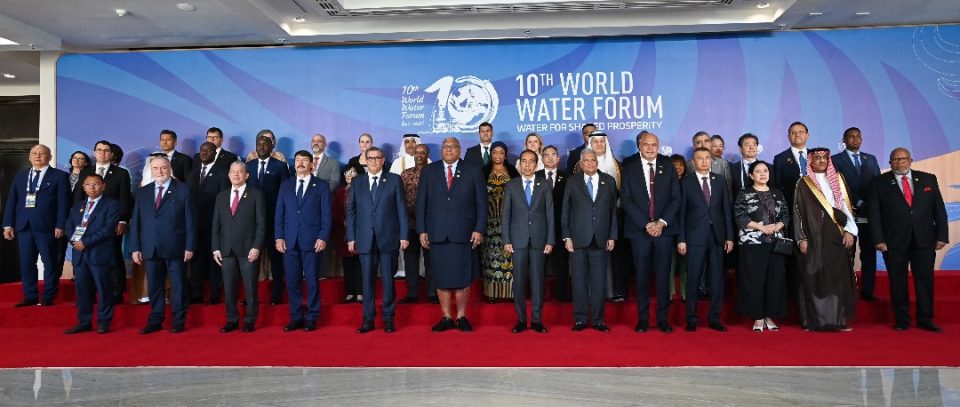Deputy Prime Minister , John Rosso and other dignitaries from around the world during the 10th World Water forum in Bali. PICTURE SUPPLIED
By Claire Mauta
Representing Papua New Guinea in the World Water 10th Forum under the theme, “Water for Shared Prosperity” held in Bali, Indonesia, was the Deputy Prime Minister, John Rosso.
Deputy Prime Minister Rosso in his opening remarks shared that this year’s theme challenges us to foster Economic Development and uphold the Fundamental Principles of Promoting Sustainable use of water to safeguard and better the livelihoods of our people and our planet Earth.
He also said that, the Management and Promotion of Sustainable Water Resources must be tailored to suit our Country’s Specific needs and circumstances with the shared Fundamental values safeguarded by being Legally Instituted through appropriate National Laws that are consistent with International Arrangements.
Deputy Prime Minister Rosso, gave a brief background of PNG in regards to Water, Sanitation and Hygiene (WaSH) and the government’s key approaches and policies to such given that PNG’s population is mostly based in the rural areas where basic services such as water, sanitation and hygiene are sometimes hard to reach.
Having said that, the key policies and approaches the PNG Government fostered are;
- The Government of PNG developed the National WaSH Policy 2015 -2030 which recognizes WaSH access as a human right. The policy introduces a framework for financing the expansion, rehabilitation and maintenance of water and sanitation service delivery primarily in rural and peri-urban settlement areas. The policy is anchored by two development milestones: the PNG Vision 2050 Plan, and the Development Strategic Plan 2010-2030.
- To address issues relating to water resources regulation, drinking water quality standards, and regulation of operations, the Government vested various responsibilities with three institutions. These are the Conservation and Environment Protection Agency (CEPA) operating under the Environment Act 2000, the Department of Health under Public Health Act, and Water PNG under National Water Supply and Sewerage Act 1986.
- Committed to fostering a culture of water conservation in schools, equipping younger generations with the knowledge and motivation to protect our precious resource. This program marks the beginning of a long-term collaboration between the two organizations, as they continue their efforts to create a sustainable future for all.
“Now, in terms of climate change, we should reaffirm that the 2050 Blue Pacific Strategy remains a Pacific wide regional approach in addressing and mitigating climate change challenges. I am confident that our dialogue partners will align their cooperation efforts towards our efforts to mitigating climate change and especially sea level rise consistent with that Strategy,” said Rosso.
Rosso called on the developed/industrialized nations to step up their efforts in effective collaboration with Pacific Island Countries and small island states in our collective efforts towards addressing climate change.
In his closing remarks, Rosso said, “this Forum sets the stage going forward for cooperation between our countries, by embracing the shared Fundamental values in providing effective Leadership and Commitment in enforcing water security and managing water related disaster challenges, in order to foster Socio-Economic Development to better our people’s welfare.
Like others, Papua New Guinea shares these noble concerns and values and commits itself to ensure that these aspirations are implemented for the Socio-Economic Development of our respective countries.”


